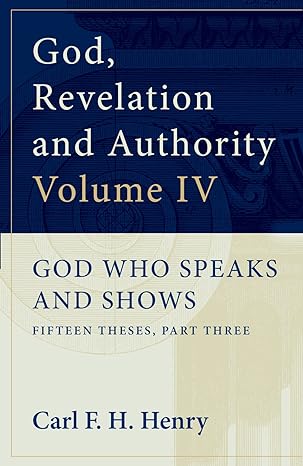A Brief Book Summary from Books At a Glance
by Steve West
About the Author
Carl F. H. Henry was one of the key thinkers and theologians of the evangelical movement in the 20th Century. God, Revelation and Authority is a seminal, multi-volume work of theological and philosophical engagement that has influenced and shaped evangelical thought for decades.
Table of Contents
Thesis Eleven: The Bible as the Authoritative Norm
1. The Modern Revolt against Authority
2. Divine Authority and the Prophetic-Apostolic Word
3. Modern Reductions of Biblical Authority
4. Divine Authority and Scriptural Authority
5. Is the Bible Literally True?
Thesis Twelve: The Spirit as Communicator and Interpreter
6. The Meaning of Inspiration
7. The Inerrancy of Scripture
Supplementary Note: Barth on Scriptural Errancy
8. The Meaning Inerrancy
Supplementary Note: The Chicago Statement on Biblical Inerrancy
9. The Infallibility of the Copies
10. The Meaning of Infallibility
11. The Spirit and the Scriptures
12. The Spirit as Divine Illuminator
Supplementary Note: Calvin on the Spirit’s Work of Illumination
13. Are We Doomed to Hermeneutical Nihilism?
14. The Fallibility of the Exegete
15. Perspective on Problem Passages
16. The Historic Church and Inerrancy
17. The Uses and Abuses of Historical Criticism
18. The Debate over the Canon
19. The Lost Unity of the Bible
Supplementary Note: Scripture as Functional Authority
20. The Spirit and Church Proclamation
Thesis Thirteen: The Spirit, the Bestower of New Life
21. God’s Graven Image: Redeemed Mankind
22. The New Man and the New Society
Thesis Fourteen: The Church as the New Society
23. Good News for the Oppressed
24. Marxist Exegesis of the Bible
25. The Marxist Reconstruction of Man
Thesis Fifteen: God and the End of All Ends
26. The Awesome Silences of Eternity
Summary
THESIS ELEVEN – The Bible is the reservoir and conduit of divine truth, the authoritative written record and exposition of God’s nature and will.
The question of authority is massively important. Scripture teaches that only God is the ultimate authority, and all derived authorities are accountable to him. Apart from God, objective moral claims cannot be substantiated, and humanistic justifications for authority in society fail. Modern man rejects God, revelation, and authority not on the basis of new arguments, but on the basis of preference and desire for freedom. God confronts people through the Bible, but he also confronts everyone through general revelation. Through creation, Scripture, and the imago Dei, God reveals his sovereign authority. Divine self-disclosure and divine authority are inseparable corollaries. Scripture has survived every attack of higher criticism, and its authority, relevance, and truth is still being upheld by young, dynamic believers today.
In the New Testament, exousia combines the ideas of power and authority. Only in God is exousia absolute; his will always holds sway, and all other powers and authorities are derivative of his. One of the fundamental realities of Christ as revealed in the gospels is that he has divine exousia. We only know about Christ through the Bible, and the first claim about the Bible is not that it is inerrant, but that it is fully authoritative as the divine word of God. The apostles were divinely authorized representatives who spoke with the authority of Christ; they were bound to the authority of the Word and had to proclaim the divine message. The apostles considered their own writings fully authoritative, and they considered the OT writings the same way. At no time did the church exist while disbelieving in the authority of the Scriptures; they always accepted the OT, and saw Christ as its fulfillment. The ontological Word of God does not undercut the epistemological norm of the written word of God.
Historical creeds and confessions uphold Scripture’s authority, but many contemporary theologians are trying to qualify or circumnavigate this position. Many others explicitly reject the idea of the authority of Scripture, and replace it with experience. All four gospels record Jesus’s affirmation of the authority of Scripture; Christ furthermore authorized the writings of the NT as on par with the OT (John 14:26). God’s word transcends every culture and stands in judgment on human ethics. Both cultural imperialism and religious syncretism must be rejected by Christians. Missionaries are to proclaim the authoritative word of God as their primary objective. Issues of absolute morality must not be confused with secondary issues of cultural expression. Whatever the intellectual rationale, “evasion of the authority of Scripture can only lead eventually to an apostate church.” Those who reject the authority of Scripture can provide no rationale for why they appeal to some parts but dismiss others. . . .
[To continue reading this summary, please see below....]The remainder of this article is premium content. Become a member to continue reading.
Already have an account? Sign In
